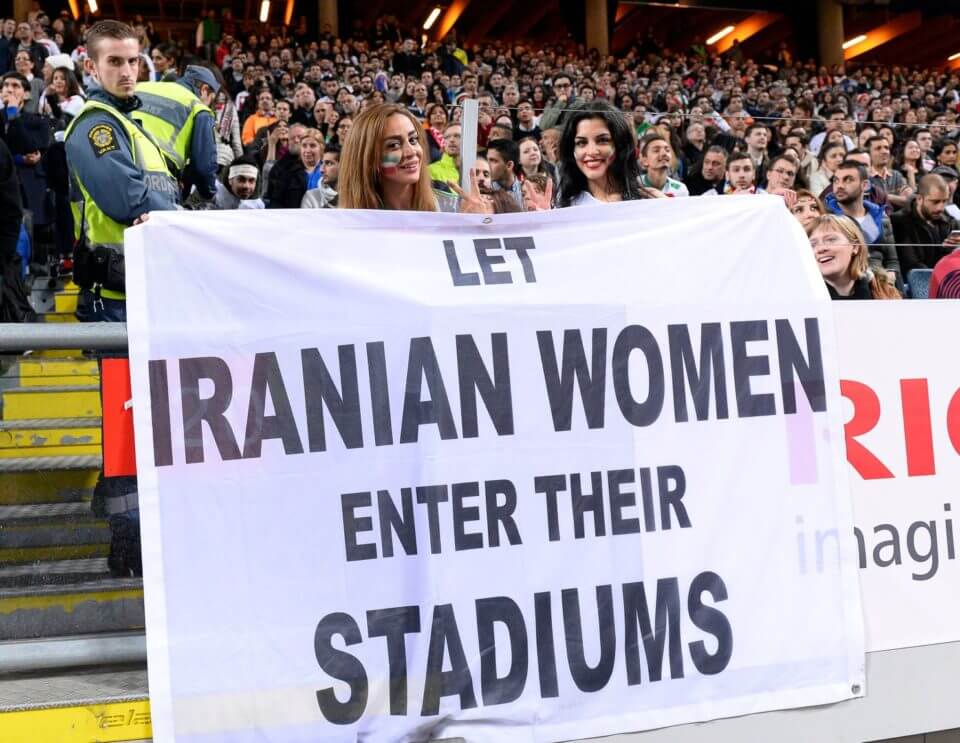
“Since women are banned from stadiums in Iran, a girl there was arrested for dressing as a boy in order to attend a soccer match. While awaiting trial, she incinerated herself to death.”
Activists, but especially those on the Left, have the unfortunate habit of harshly judging Western civilization but giving a free pass to other cultures on the same issues—in the name of post-colonialism or multiculturalism—and sometimes motivated by a degree of “white guilt.” Soccer is no exception. Recently, Inter Milan’s Romelu Lukaku, a black player, had to endure listening to monkey sounds during a match against Cagliari. Naturally enough, activists were quick to accuse Italian fans of racism. Making monkey sounds is despicable behavior, to be sure. But, how exactly can FIFA enforce that fans do not make hurtful chants? There are no easy answers.
As of late, gender issues have also come to the front in soccer’s culture wars. The U.S. Women’s soccer team won the world championship, but there was widespread outrage with the fact that they are paid less than men. As I have argued, this is not as unfair as it seems, given that male players actually do manage to fill the stands with fans, whereas female players do not.
I suppose racism and gender discrimination in soccer are complex issues, and it is always healthy to open the conversation about them. But, conversations need to have priorities. Unfortunately, social justice warriors (SJWs) seldom get their priorities right. Take an even more recent event: since women are banned from stadiums in Iran, a girl there was arrested for dressing as a boy in order to attend a soccer match. While awaiting trial, she incinerated herself to death. As compared to monkey chants or gender pay gaps, this is far more urgent issue and a question of real justice.
Yet, there is comparatively little uproar coming from the SJWs. Does the fact that this is an instance of brown men oppressing brown women (instead of white men oppressing black men—or white men oppressing white women) have anything to do with it? Of course it does. SJWs are terrified of committing the mortal sin of neocolonialism. After all, when the British outlawed sati (the practice where an Indian woman takes her own life atop the grave of her deceased husband), post-colonialist guru Gayatri Spivak mocked their arrogance by describing the situation as, “white men saving brown women from brown men.” No SJW wants to be mocked this way, so they prefer to castigate white men and simply leave non-Westerners alone. Many SJWs will ultimately repeat the relativist mantra that all cultures are equal (but, somehow, in this strange equality, Western civilization is inferior in many ways).
Fortunately, not all feminists are this hypocritical. Susan Moller Okin asked an important question in the title of her 1999 famous essay: “Is Multiculturalism Bad for Women?” Her answer was a staunch “Yes.” Sure, the struggle for women’s liberation is not over. But, before making further advances in the West, we must not forget about those who lag behind in other parts of the world. If multiculturalism is just about having many ethnic restaurants in the food court and listening to many types of music on the radio (“boutique multiculturalism,” to use Stanley Fish’s phrase), then everything is great. But, if multiculturalism is about not applying the same moral standards cross-culturally—all in the name of relativism—then feminists should have a problem. Sadly, most do not.
Actually, I am not that concerned about Western feminists not caring much about Iranian women because, in fact, Iranian feminists themselves do care. Do not think for a moment that Iran is only a place of old bearded ayatollahs. As Azar Nafisi narrates in her famous memoir Reading Lolita in Tehran, Iranian women do want their freedoms back, and they will do many ingenious things to bypass the old farts’ restrictions. Nafisi eventually left Iran, but people within Iran have not given up.
Forget about Rocky or the Bad News Bears: this is hands-down the best sports film ever made.
Take, for example, Jafar Panahi. Whereas Western feminists will probably not care much about the poor girl who was recently arrested for attending a soccer match, already in 2006 Panahi made a film exactly about this issue entitled Offside. Forget about Rocky or the Bad News Bears: this is hands-down the best sports film ever made. In this movie, not one, but five girls dress up as boys to go to an Iran-Bahrain match. They are discovered by the police and are held in the stadium, waiting to be transferred to jail. Panahi portrays hilarious situations: everyone seems to be aware of how absurd the prohibition against women attending soccer matches is, but nobody dares do anything major about it, though they do dare to do little things in order to help the girls. Ultimately, only because Iran wins in the last minute, the guards are joyful enough to release the girls, who join massive celebrations in the streets of Tehran. Predictably, the regime was not impressed with the film, and to this day it is banned in Iran; Panahi is not allowed to leave the country, not even to collect awards at the Cannes Film Festival.
But, Offside is still a reminder of important things. Soccer is a global force to be reckoned with, and—very much as ping-pong brought Nixon and Mao Tse Tung closer—22 men (or women) running after a ball can be a valuable resource in the quest for world peace. Instead of toughening sanctions, perhaps President Donald Trump should explore how a soccer ball can help sort out tensions with a nuclear-ambitious in Iran. Likewise, soccer can be a great launching pad for reforms in Iran. Underneath the surface of America-is-the-great-Satan rhetoric, there is great desire for rapprochement with the West in Iran. This is a highly-educated country that is unfortunately run by grumpy ayatollahs, but there is such great potential in its population. Hopefully, even if Western feminists neglect their Eastern sisters in the name of relativism and out of white guilt, liberation for women in Iran is close at-hand.
Dr. Gabriel Andrade teaches ethics and behavioral science at St. Matthew’s University School of Medicine. He has previously contributed to Areo Magazine and DePauw University’s The Prindle Post.










